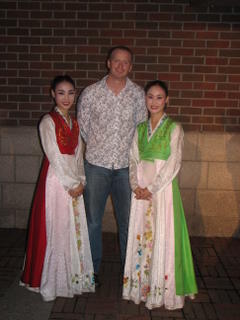Wednesday, October 12, 2005
The Hottest News Around

There were a good many tidbits of information passed on to me in my first few weeks in South Korea that I couldn’t help but find a bit disconcerting. Right after my flight arrived in Seoul, I was taken by van to the headquarters of the Seventh-day Adventists language institute, during which the academic dean pointed to a large stone structure connected to an overpass by the river. “Do you know what that is?” he asked.
After I shook my head laterally, he answered, “That’s in case North Korea ever invades, they can drop that on the road to buy people more time to get away.”
If there’s one thing a guy having just left home and come to a distant country for the first time doesn’t want to think about in the first four hours, this would be it.
The second alarming bit of information took place upon my arrival at the temporary guest housing in Seoul, where I was kept during orientation in my first week. I noticed a sign on the wall that read, “Please do not flush toilet paper down the toilet. Koreans put toilet paper in the waste basket after use. This is especially important to remember while staying in guest housing.”
While our definition of a “civilized society” often is based on several factors, like economic status, equal rights for all citizens and whether or not they can elect their own leaders, where toilet paper is placed “after use” has since moved substantially higher on my list.
The anecdote that alarmed me the least at the time but probably had the longest-term implications took place after I was assigned to teach in Suncheon, about a four-five hour drive south of Seoul. The director of the Suncheon institute, a Korean Adventist minister everyone calls Pastor Moon took me and some others out for dinner at a traditional restaurant, replete with chopsticks, tables six inches from the ground and dagger-eyed stares if one’s be-shoed feet should make contact with the floor.
Having been brought a plate full of various vegetables we could add condiments to or mix with rice, Pastor Moon pointed to a selection of green peppers and said, and I quote, “Don’t try this, it will kill you.” He elaborated, saying that it was too spicy for him.
This was, in fact, basic syllogism: Pastor Moon has lived in Korea all his life and is well-acclimated to their culinary tastes. Therefore, if a type of food is too spicy for him, then I, as a foreigner who wasn’t a huge fan of spicy meals to begin with, would probably lose all command of motor skills and the use of at least three of the five senses after a single bite.
Something you might not know, because I certainly didn’t beforehand, is that the people of Korea eat the hottest food on earth. I am not exercising my rhetorical tendency toward hyperbole when I say so; they are quite proud of the fact. They eat spicy food several times daily, often considering the food of other countries stale by comparison. A book the new Adventist teachers were given actually said that South Korea tops the worldwide list for stomach cancers, but this does not slow them down.
For them, it’s the sensation: they can exercise the senses of taste and touch at the same time. For a Westerner not accustomed to their diet, a single meal can give one the sensations of running a 10K, suffering from influenza and mourning the loss of a loved one all at once. When the teachers all gather to eat together, the following conversation can often be overheard:
Korean Teacher: How is the food?
Me: *Sniff* I promised myself I wouldn’t get emotional.
Korean Teacher: This is not spicy for me. This is normal.
Me: *Blows nose loudly*
Other Foreign Teacher with More Experience: You’re going to have to get used to the spicy food, Rob.
Me: How do I say, ‘Waiter, I need my water refilled for the twelfth time’ in Korean?
Other Korean Teacher: Does it taste good?
Me: Yes, actually, it tastes great. Is there a fire extinguisher I can use on my lips?
However, I don’t want to give the impression that the Korean staff haven’t been accommodating. They have worked very hard to make sure that I and the other foreign teachers are settling in. They regularly visit my apartment to make sure that I have enough to eat and offer other tips so that my stay will be enjoyable. Pastor Moon himself regularly visits with fruit and other help, including household advice like: “Don’t leave your fan on and close all the windows and doors while you sleep. You could…uhm, die.”
So while there are always adjustments to make in a new place, in the end it’s really all about the people you meet and the experiences you have. I’ll write with more of these events next week.
I hope.
Comments:
<< Home
we stopped at a rest stop in macon, and the sign in the bathroom told us to throw the toilet paper in the trash can too. guess not all of america is civilized either, huh. :)
Post a Comment
Subscribe to Post Comments [Atom]
<< Home
Subscribe to Comments [Atom]

